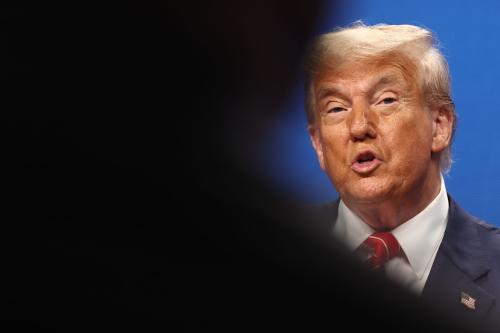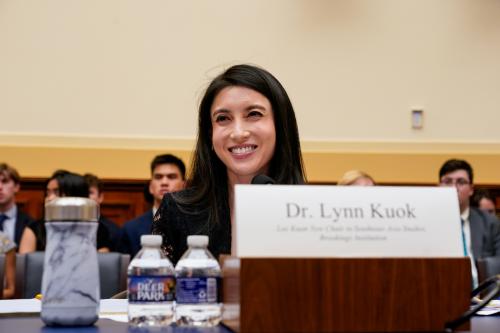Taiwan’s democratic system exhibits multiple faces at the same time. Positive and negative trends coexist simultaneously. Both optimism and pessimism are warranted. Dark clouds possess silver linings—but they are still dark clouds. Yet if one asks whether democracy has made Taiwan more stable, the answer is unequivocally yes. The message for Taiwan’s policy makers—and China should take note—is that they would do well to listen to the centrists tendencies of the Taiwan people, who see no contradiction between establishing their identity and recognizing that their prosperity cannot ignore China as a major driver in the world economy.
Face Number One: The results of the 1990s transition to democracy have not been fundamentally reversed in any significant way. This is a significant achievement. Whatever problems Taiwan has, it is not like Thailand with its military coups. Free and fair elections are the mechanism through which the people select the island’s political leaders, and it is the people who do the selecting. A genuine legislative process creates the island’s laws (and if there were ever constitutional change, it would be through a similar process). The press is free and vibrant. Political parties and a diverse civil society channel public opinion. The judiciary is independent, as exhibited by the recent trial of Wu Shu-chen and Ma Ying-jeou. The structure of formal democratic institutions that emerged over a decade ago continues basically unchanged.
Face Number Two: Formal democratic institutions may exist but they don’t work well. The transition to democracy was successful but it has not been followed by a full consolidation of democracy. Regrettably, Taiwan’s institutions—semi-presidentialism, the legislature, the party system, the electoral system, and the mass media—work together in a perverse way that rewards political gamesmanship over good policy. They reduce accountability, foster a zero-sum political psychology, promote policy deadlock, ensure suboptimal policy performance, and defer consensus on the rules of the game.
We believe the problems here are mainly structural and systemic. One political camp or the other can be blamed for mistakes that each has made over the last decade to contribute to the current state of affairs. But political actors are acting within a structure that encourages these unfortunate types of behavior. Until systemic reforms are devised to correct these systemic problems, the dysfunction will continue and politicians will continue to perform according to the cues that the system creates. The losers will be the people of Taiwan, because Taiwan will be placed at a growing disadvantage vis-à-vis China.
Face Number Three: Some people believe that Taiwan’s democracy is bad for regional peace and stability. The logic of this view is that an open competition for power on the island allows the emergence of leaders who may change or threaten to change Taiwan’s legal status (“Taiwan Independence”), thus challenging China’s legitimate interests and provoking a forceful Chinese response. At its most extreme, those who hold this view believe that demagogic Taiwan politicians use separatist themes to manipulate public opinion and inflate their own power. Whether this view is true is less important than the fact that some important actors believe it. And whether China is changing the status quo by its own actions and whether it is misinterpreting the intentions and actions of Taiwan leaders is another question entirely.
It is certainly true that the transition to democracy did permit the open discussion of de jure independence for Taiwan for the first time and legalize the existence of the Democratic Progressive Party. There is no question that Taiwan identity has grown stronger over the last two decades (in part because of PRC actions), and that Taiwan identity has affected government policy because of the island’s open political system. Certainly, the Dark Green with its unique approach to protecting Taiwan’s interests remains a significant political force. It is also true that, as Taiwan approaches its next presidential elections, it has opted for moderates as the candidates in both political parties, eschewing calls for extremism at the margins of both the KMT and DPP. Even as Taiwan identity has grown stronger, so too it appears has Taiwan pragmatism.
Face Number Four: Despite the strength of Taiwan identity and the existence of de jure independence sentiment, what is remarkable is that Taiwan’s democratic system, imperfect as it is, has in some ways acted as a moderating force to shape a centrist consensus to defer discussion of ultimate solutions like unification or independence. A significant majority of the public wishes to preserve the status quo (even though they probably don’t agree on what the status quo is). The implication of that fact is that an even greater majority of the population opposes taking action either to carry out de jure independence or to accept unification on Beijing’s terms.
Recent research suggests that the level of Taiwanese nationalism (Taiwan identity, desire for de jure independence, and hostility towards China) is strongest among the generation that came of age at the height of KMT authoritarianism. On the other hand, attitudes among the younger generations are more moderate and pragmatic. They see no contradiction between loving Taiwan and pursuing positive cross-Strait economic and political relations.
A minority on Taiwan opposes economic dependence on China. But the majority apparently realizes that Taiwan’s economic future lies with the Mainland and that it has sufficient assets to manage the attendant risks. Most of all, the population wants peace and a better life for their families. When given a chance to express these views democratically, Taiwan’s voters have brought both the KMT and DPP to the center, as was the case in the mayoral elections in Taipei and Kaohsiung in December 2006.
This reality would seem to present an opportunity—indeed an imperative—for Taiwan’s presidential candidates to base their campaigns on mobilizing the center of the electorate (rather than the stirring up the base). A centrist strategy that emphasizes moderation, cooperation, and peace has two other advantages. It would demonstrate to actors outside of Taiwan that elections need not be a cause for concern and so offer reassurance that the island’s system is indeed a force for stability. Second, a return to dominance of the center of the political system as in the 1990s (giving initiative to the Light segments rather than the Dark ones) would create the possibility for political reform to correct many of the problems of the current system and so consolidate Taiwan’s democracy.
Finally, there is a lesson for China. It should not fear Taiwan’s democracy. For all its concern about individual Taiwan politicians, it should have confidence that the island’s people will continue to opt for what is in their self-interest, and that is a more prosperous future. That means a future that is entwined economically with China. China should welcome such pragmatism. By all means, Beijing should avoid being provoked into taking reckless action. On the contrary, Chinese moderation can produce the positive outcome it most desires from Taiwan’s democracy: that the Center prevails and holds.
The Brookings Institution is committed to quality, independence, and impact.
We are supported by a diverse array of funders. In line with our values and policies, each Brookings publication represents the sole views of its author(s).



Commentary
Op-edThe Four Faces of Taiwan Democracy
September 15, 2007